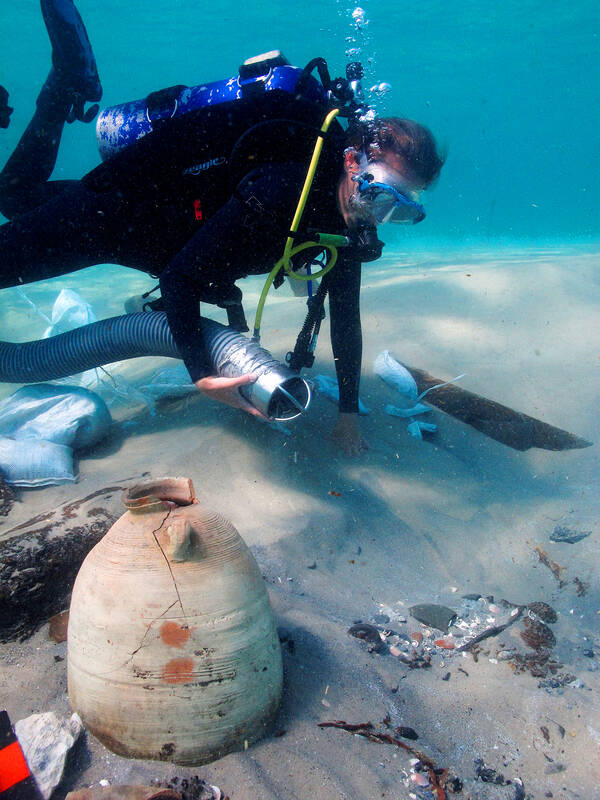An ancient shipwreck found off the shore of Israel and loaded with cargo from all over the Mediterranean shows that traders from the West still came to port even after the Islamic conquest of the Holy Land, researchers say.
A surprise storm? An inexperienced captain? Whatever the reason, the merchant ship made from fir and walnut trees, and carrying containers with delights from far-off lands sank in the shallow waters off what is today the Israeli coastal community of Maagan Michael more than 1,200 years ago.
It was around the time the largely Christian Byzantine Empire was losing its grip on that area of the eastern Mediterranean region and Islamic rule was extending its reach.

Photo: Reuters
The shipwreck, dated to the seventh or eighth century, is evidence that trade persisted with the rest of the Mediterranean despite the religious divide, said Deborah Cvikel, a nautical archaeologist at the University of Haifa and director of the dig.
“The history books, they usually tell us that ... commerce almost stopped. There was no international commerce in the Mediterranean. We had mainly smaller vessels sailing along the coast doing cabotage,” she said.
However, this no longer seems to be the case.
“Here we have a large shipwreck, which we think the original ship was around 25 meters long, and ... laden with cargo from all over the Mediterranean,” she said.
Artifacts on deck show the ship had docked in Cyprus, Egypt, maybe Turkey and perhaps as far away as the North African coast.
The coast of Israel is abundant with ships that sank over the millennia. The wrecks are more accessible to study than elsewhere in the Mediterranean because the sea off Israel is shallow and the sandy bottom preserves artifacts.
A storm might shift the sands and expose a relic, which is what happened with the new discovery at Maagan Michael. Two amateur divers spotted a piece of wood sticking out from the bottom and reported it to authorities.
Eight excavation seasons later, Cvikel’s team has mapped out much of the wooden skeleton that remains.
Using underwater vacuum cleaners to clear out 1.5m of sand, they found more than 200 amphoras that still contained ingredients from the Mediterranean diet, such as fish sauce, and a variety of olives, dates and figs.
There were sailing tools such as ropes and personal items such as wooden combs, as well as animals, including the remains of beetles and six rats.
“You have to be very attentive because some of the remains, like fish bones or rat bones or olive pits, they are so tiny that it could be lost in a split second,” Cvikel said.
Some of the cargo bore symbols of the Christian Byzantine church and others had writing in Arabic.
Researchers said thay hope to find a hall to display the ship in its entirety to the public, otherwise they would cover it with sand and leave it at the sea bottom with the countless other wrecks.

MONEY GRAB: People were rushing to collect bills scattered on the ground after the plane transporting money crashed, which an official said hindered rescue efforts A cargo plane carrying money on Friday crashed near Bolivia’s capital, damaging about a dozen vehicles on highway, scattering bills on the ground and leaving at least 15 people dead and others injured, an official said. Bolivian Minister of Defense Marcelo Salinas said the Hercules C-130 plane was transporting newly printed Bolivian currency when it “landed and veered off the runway” at an airport in El Alto, a city adjacent to La Paz, before ending up in a nearby field. Firefighters managed to put out the flames that engulfed the aircraft. Fire chief Pavel Tovar said at least 15 people died, but

LIKE FATHER, LIKE DAUGHTER: By showing Ju-ae’s ability to handle a weapon, the photos ‘suggest she is indeed receiving training as a successor,’ an academic said North Korea on Saturday released a rare image of leader Kim Jong-un’s teenage daughter firing a rifle at a shooting range, adding to speculation that she is being groomed as his successor. Kim’s daughter, Ju-ae, has long been seen as the next in line to rule the secretive, nuclear-armed state, and took part in a string of recent high-profile outings, including last week’s military parade marking the closing stages of North Korea’s key party congress. Pyongyang’s official Korean Central News Agency (KCNA) released a photo of Ju-ae shooting a rifle at an outdoor shooting range, peering through a rifle scope

South Korea would soon no longer be one of the few countries where Google Maps does not work properly, after its security-conscious government reversed a two-decade stance to approve the export of high-precision map data to overseas servers. The approval was made “on the condition that strict security requirements are met,” the South Korean Ministry of Land, Infrastructure and Transport said. Those conditions include blurring military and other sensitive security-related facilities, as well as restricting longitude and latitude coordinates for South Korean territory on products such as Google Maps and Google Earth, it said. The decision is expected to hurt Naver and Kakao

Australian Prime Minister Anthony Albanese yesterday said he did not take his security for granted, after he was evacuated from his residence for several hours following a bomb threat sent to a Chinese dance group. Albanese was evacuated from his Canberra residence late on Tuesday following the threat, and returned a few hours later after nothing suspicious was found. The bomb scare was among several e-mails threatening Albanese sent to a representative of Shen Yun, a classical Chinese dance troupe banned in China that is due to perform in Australia this month, a spokesperson for the group said in a statement. The e-mail